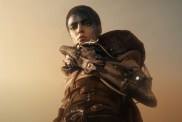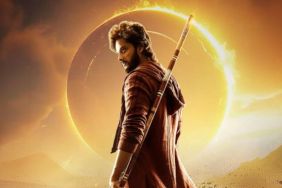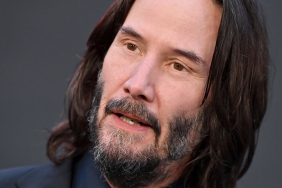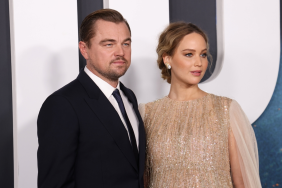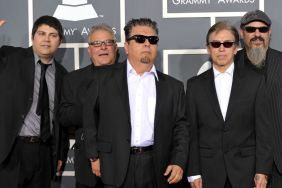Invincible Pictures is opening writer/director Kevin Smith’s bonkers kids movie Yoga Hosers in limited release today, and we were lucky enough to get to sit down at this year’s Fantasia Fest for an exclusive 1-on-1 with the Clerks icon to discuss playing the tiny sausage Nazis (Bratzis) in the film, working with Johnny Depp, as well as his final film in the “True North Trilogy” Moose Jaws. He also discusses his future TV series MallBrats and the potential “Buckaroo Banzai” series.
RELATED: Kevin Smith Talks His Buckaroo Banzai Series Director Wishlist
ComingSoon.net: So I remember hearing years ago that Deep Roy had to shoot so much for “Charlie and the Chocolate Factory” that they paid him a million dollars because it was such a strenuous thing, like having to act all those Oompa Loompas out. What was it like for you having to play all those Bratzis?
Kevin Smith: For me, it was easy. I hired Andy McElfresh, who’s the guy that I do podcasts with called “Edumacation.” Andy used to work for “The Tonight Show.” So he used to do a lot of things aside from write. He got into the DGA because he’d make the bumpers, they’re called, those things that lead you in and out of a commercial or whatnot, like a f*cking landscape or something that’s always in front of you, whatever, and it’d say, “The Tonight Show.” So he did that for a bunch, and then he learned how to use Maya and stuff. So I said, “Dude, this movie’s supposed to look like kind of an ’80s movie. Why don’t you do the special effects? Why don’t you turn me into the Bratzis? It can’t be that difficult, right, it’s green screen. You just gotta shrink me down and stuff and put legs on me,” because those weren’t my legs, obviously.
And so, he was like, “I think I can.” And we definitely overtaxed him. He was a one-man f*cking effects department. But he did it all himself. And then, on the day, he would tell me what we needed. Like, basically, since I was the editor, I came up with a list of, “These are the 26 things I need to put the movie together, Bratzi moments.” And so, Bob Kurtzman made me up in makeup and sh*t and I’d stand there in front of a green screen. And you’re wearing like, rubber this thick around you, so you can’t necessarily hear anything. So Andy would come over and just be like, “I need you to say ‘nein.’” And I’d be like, “Nein.” And then just every beat, we built it. It helps being the editor, because you know what you need to do.
So the notion of, I will just shoot it all later and figure it out, really changes when you’re the guy in the f*cking suit. Suddenly you’re like, “We’re going to shoot exactly what we need and then I’m going to get the f*ck out of this suit because this hurts and it’s very hot.”
CS: Yeah, you don’t have Tim Burton there being like, “Ah, let’s do another one.”
Smith: No. I mean, let’s be honest, even if I wasn’t the guy in the suit, I probably wouldn’t be Tim Burton-ing it, you know? I wouldn’t be saying like, “Oh, let’s go for perfection.” I’m the king of “good enough,” man. Like, I come from indie films, so good enough is a concept that gets you to the end of the day. Some people go for great, and that’s fantastic. I appreciate that, but sometimes just accomplish good enough. Believe me, I’m not like, “I settle on good enough because good enough is good enough for me,” but it’s just like, some sh*t don’t deserve much more than good enough. You know what I’m saying? So TV works on a good enough basis as well. It’s all about time in TV. You’ve got like, eight days to shoot 50 pages, so you can’t sit there and be like, “Hrm. You didn’t quite get it. Take 12.” F*ck that. If you’re on take 12, you don’t ever get asked back or anything like that. So it’s good enough. And with this movie, so much of it was good enough. But particularly the stuff in the suit with the effects, because as the guy in the suit, I was just like, “Oh, f*ck this. Never again.” I remember telling Bob Kurtzman right away, I was like, “Nobody’s playing that moose.” [in “Moose Jaws”] It was almost penance, because I remember at one point when we made the movie, when we shot Justin Long’s stuff, I wasn’t even going to be in “Yoga Hosers.” Jason Mewes was going to play the Bratzis, but he didn’t wind up doing it because he was kind of claustrophobic.
So when Justin saw that I did it, he’s like, “You were in the makeup?” He’s going, “That kind of makes up for what you did to me.” Because he had to live in that “Tusk” f*cking suit for a long time. So it felt a little bit like payback on myself, where I was like, now I know what Justin felt like. But it just meant for sure that like, in the next one, nobody’s going to be in that suit. It’s going to be a puppet or f*cking CG.

CS: And you said this was a small movie. I think it was around $5 million, right?
Smith: Between $4 and $5 million.
CS: And even though it was a low=budget production, I imagine Johnny Depp isn’t pulling up in a Nissan Altima and getting into makeup. What comes with Johnny Depp?
Smith: He pulls up in a Nissan Sentra and goes into makeup. Not a lot, to be honest with you. I remember on “Tusk” it was about, “Can you bring my makeup artist on,” because again, we can’t legally not pay him, so we’re giving him scale, but you might as well f*cking give him hair. This is a dude who’s used to stepping onto a set and there’s a very massive check involved. So you know, it’s important in life to know which way the favor goes. And once you realize, “Holy sh*t, he’s doing us the biggest f*cking favor in the world,” you try to do as many back in return. He asked for his makeup artist on “Tusk” and I didn’t even know what that meant. I just thought he preferred a guy as opposed to a stranger touching him or something. I was like, “Oh my god, totally.” And he brought Joel Harlow. Joel does him on all the “Pirates” movies. He did him for f*cking “Black Mass,” like after “Black Mass” they came to us for “Yoga Hosers” and stuff. So I had no idea he was talking about wearing a f*cking prosthetic nose. I just thought he meant makeup. He came—like when I went to his trailer, boom, he’s wearing this f*cking rubber nose and sh*t.
CS: He got all Lon Chaney-d out.
Smith: Probably because he was like, “I can’t f*cking be recognized in this movie.” But yeah, for whatever the reason, he went over more than I ever would’ve asked for and stuff like that. So he doesn’t bring over the top costs. And he doesn’t make your day longer. He makes it shorter because he’s kind of a one-take guy. Not like, he does it and he’s done. You do it and you’re like, “Yeah.” It’s beyond, that’s good enough, that’s great enough. We’d do it again, but we’re just gilding the lily and stuff. And in a world where he’s working for nothing, you want to get him out fast. So we tend to kind of work very fast, because he’s f*cking fantastic at what he does. Rarely do you get to work with somebody who’s so f*cking good at what they do, but he likes to have fun. So there’s no like, fallout. There’s no like, oh, here comes this expense or anything like that. It’s fun. Think about it. Both “Tusk” and “Yoga Hosers” were made the same way. We made most of the movie without him, and then we made his stuff with him. So “Yoga Hosers” was shot for three weeks without him. And then, those two days, we shot all the Guy Lapointe stuff in two days in California like months later. So you’re getting him not like, I’m pulling him from this to this to this, he’s like, “I’m absolutely free. Let’s go play.” So he’s at his most f*cking mellow, most ready f*cking collaborating stuff. And then, same with “Yoga Hosers.” We shot the whole movie, and then all his stuff, we shot over the course of a week, like two months after we wrapped the flick. So you’re getting him, and he’s working with his kid and he’s known Harley since Harley was five. And I’ve known him since the kids were young. So he’s just comfy. And on “Tusk”, after the first day, he’s like, “How many pages did we shoot?” And I was like, “Close to 20.” He’s like, “Three scenes?” And he’s like, “Jesus Christ. I’ll be in all your movies, dude. A Kevin Smith movie, you just sit down and talk for pages.” He’s like, “I didn’t even have to move.” I was like, “Welcome to a Kevin Smith movie.”
So and he brings nothing but good. There’s no f*cking like, well, here comes the baggage and sh*t. Lookie loons, I guess, we’ll get a lot more people trying to see what we’re doing, but we weren’t making “Star Wars,” so we weren’t like, “F*cking nobody can see this.”
CS: No drones flying overhead.
Smith: Yeah, I mean, it wasn’t that bad, but there were definitely telephotos when we were shooting downtown.

CS: It was interesting that you announced that you were doing “Buckaroo Banzai” because when I heard the plot for this film, I’m like, “Oh, it’s the same kind of absurd, left-field fantasy kind of thing.”
Smith: Honestly, dude, that and “Flash” is why I wound up in “Buckaroo Banzai” land, because they had a lot of success turning “Fargo” into a series. So they were like, “Let’s do it with ‘Buckaroo Banzai.’” They all loved it. They knew they had interest in that work. So they were starting to put it together and they were trying to figure out who to do it with and somebody said, “Kevin Smith did a podcast with Peter Weller and John Lithgow once. I think he’s a big fan.” And so, they watched “Tusk”, because they’re like, “What’s the last thing he did?” And it was “Tusk.” And then they heard that I had just directed “Flash.” They’re like, “Well, he can do episodic and he can clearly do weird, so let’s see if he wants to do this.” So I went in and suddenly I was the guy. So it had everything to do with “Tusk.” I know I’m supposed to get punished for making unconventional things, but sometimes the risky sh*t is what makes people go, “Oh. Sh*t.” So suddenly that sensibility comes in more handy, but it makes sense because “Buckaroo Banzai” shaped my sensibility. I saw it at age 14, and fell in love with it. I had the poster on my wall and stuff. And they’re full of rubber, just like “Tusk” and f*cking “Yoga Hosers.” And it’s just like, it doesn’t conform to what it’s supposed to be, and by any stretch of the imagination, that’s what makes it good.
CS: Stream of consciousness.
Smith: And it plays like a Thomas Pynchon novel, you know, but less so than “Star Wars” or the hero’s journey, and more so Pynchon, I guess. But it’s such a bat sh*t wonderful movie, but it wasn’t for everybody. And you try to show it to some people and they’re like, “I don’t get it, dude. What’s with this?” And you’re like, “What?” So that was rarified breathing. And I breathed it perfectly. So this is what I like to breathe, it is my oxygen. And so, it makes sense that my stuff that I do would be kind of left of center and sh*t like that. I grew up watching “Star Wars,” so you can imagine if my sh*t had been more traditional. But I don’t think I was meant to be a director. I think I was definitely meant to be a storyteller, but a filmmaker, not at all. That’s something that might have come along later on down the road. But I saw “Slacker” and it made me go, “Oh f*ck, I think I can make a film.” And so, suddenly I wound up in film. So I guess it was inevitable I wound up doing this movie. This is the kind of sh*t that I grew up watching. And I grew up watching more of this, like “Re-Animator” and “From Beyond” than I did watching movies like “Clerks” or “Chasing Amy.” So those are the movies I could make, this is the movie I wanted to make.
CS: On that note, I don’t know if you’ve seen “Stranger Things” on Netflix?
Smith: I’m on episode two. Love it. Fantastic.
CS: It’s c’est magnifique. But I talked to Shawn Levy about it, because we were trying to compare it to “Super 8.” And I was like, “This is so much more nuanced than ‘Super 8.'” And he’s like, “Well, we had eight hours.” So I’m wondering, how is working on “Banzai” and “MallBrats” as TV shows enabling you to inject more nuance into your storytelling?
Smith: So wonderful. I mean, “Mallrats” would’ve been 90 minutes, and “Mallrats” the first one was a mixture of John Hughes and John Landis. The “Mallrats 2” script was definitely more John Landis than John Hughes. It was very over the top, whereas the series allows you to swing it back towards Hughes, so it’s more…
CS: Like theatrical?
Smith: And soap opera-atic and a story about, ultimately, “Mallrats” is a story of two guys that get dumped and go to the mall. “Mallrats 2” was about a terrorist attack on a mall. One of these things is not like the other. So now, “Mallrats 2” is like, it’s not as much that, it’s something kind of different. It’s closer to “Mallrats.” It allows you to tell a more human story, and nuanced, absolutely. You can dive into characters that you can’t do in 90 minutes. I can spend a lot more time with Rene, Shannen Doherty’s character in the series than I did in the feature. The feature’s all Brodie, Brodie, Brodie and sh*t like that. And everybody was there. But now, in the series, I get to play with longer, give them more stuff to do, bring them back in other episodes, so it’s more playful.
Yoga Hosers is now playing in limited release.
Yoga Hosers
-
Yoga Hosers

YogaHosers_9_5_165A.JPG
-
Yoga Hosers

YogaHosers_9_12_0205.JPG
-
Yoga Hosers

YH_12-30_2727.jpg
-
Yoga Hosers

-
Yoga Hosers Set

-
Yoga Hosers Set

-
Yoga Hosers Set

-
Yoga Hosers Set

-
Yoga Hosers Set

-
Yoga Hosers Set



